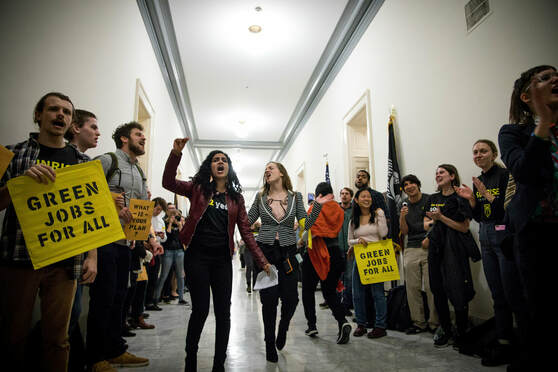|
Dean Baker Senior Economist at The Center for Economic and Policy Research (CEPR)  Editorial credit: Rachael Warriner / Shutterstock.com; Picture Detail. Washington DC/USA- November 13, 2018:Student activists with the Sunrise Movement occupy Nancy Pelosi's office to demand that she and the Democrats act on climate change. Editorial credit: Rachael Warriner / Shutterstock.com; Picture Detail. Washington DC/USA- November 13, 2018:Student activists with the Sunrise Movement occupy Nancy Pelosi's office to demand that she and the Democrats act on climate change. In the United States, the pay of a typical worker has badly trailed productivity growth over the last four decades, allowing only marginal improvements in living standards over this period. At the same time, a small number of people have gotten incredibly rich in the finance and tech sectors and by being top executives in major U.S. corporations. There is a similar, if somewhat less stark, picture in most other wealthy countries. The standard story for this rise in inequality is that this is just the inevitable course of globalization and technology. While many in the elite may feel bad for those left behind, and even propose policies to help them, the line is that the rise in inequality is something that happened, not the result of conscious policy.
0 Comments
Dean Baker Senior Economist at The Center for Economic and Policy Research (CEPR)  Editorial credit: JStone / Shutterstock.com Picture detail: NEW YORK - APRIL 4, 2019: Democratic presidential candidate Pete Buttigieg speaks during the National Action Network Convention on April 4, 2019, in New York. Editorial credit: JStone / Shutterstock.com Picture detail: NEW YORK - APRIL 4, 2019: Democratic presidential candidate Pete Buttigieg speaks during the National Action Network Convention on April 4, 2019, in New York. In his campaign for the Democratic presidential nomination, Pete Buttigieg has been telling audiences that the U.S. lost six times as many jobs due to automation than trade from 2000 to 2010, according to The Washington Post. This is literally true, but for all practical purposes it is a very big lie. The way in which it is true is that we always lose jobs to “automation,” which is known to economists as productivity growth. Productivity growth averages around 2 percent annually (it has been closer to 1 percent since 2005). If productivity grows by 2 percent, this means that we can produce the same amount of goods and services with 2 percent fewer worker hours. |
Be our guest.
Interested in being featured on our blog? We'd love to hear from you. Find out more. ARCHIVES
May 2024
CATEGORIES
All
|
Copyright © 2023 The Zambakari Advisory - Privacy Policy
Our site uses cookies to improve your experience. You can control cookies by adjusting your browser or device settings.
If you continue without changing your settings, we assume that you are happy to receive all cookies.
If not, please feel free to opt out here.
SEO by Qasim Khilji
Our site uses cookies to improve your experience. You can control cookies by adjusting your browser or device settings.
If you continue without changing your settings, we assume that you are happy to receive all cookies.
If not, please feel free to opt out here.
SEO by Qasim Khilji
